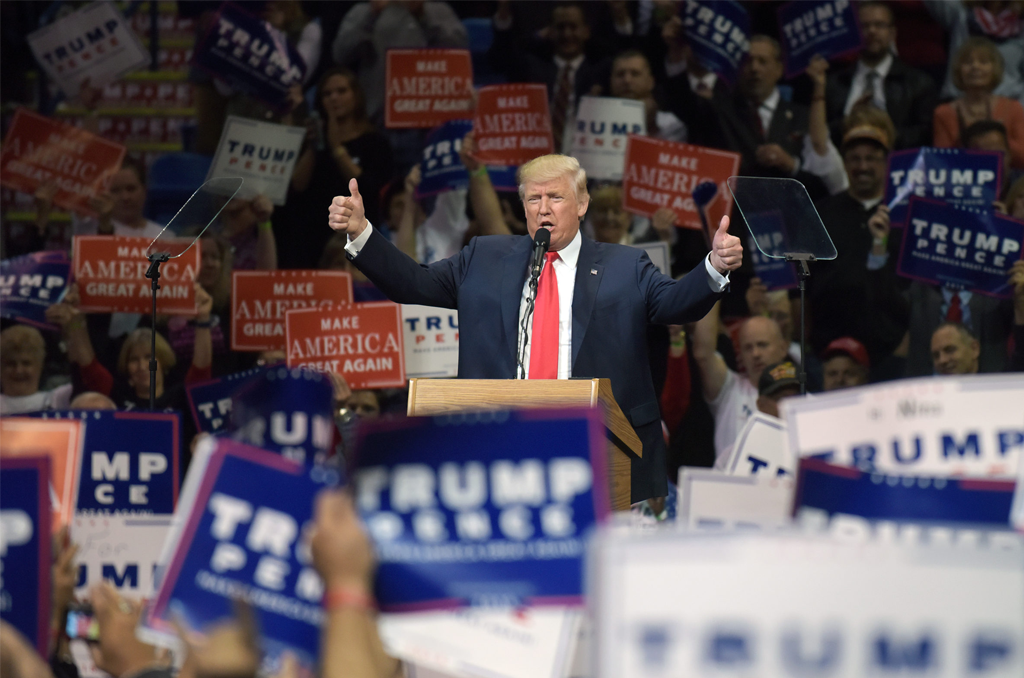Tariffs – Pictured: Donald J. Trump at rally – Courtesy: Shutterstock by Matt Smith
Shoppers and small businesses in Gainesville, Florida, a small city in the state’s north-central region, are preparing for the effects of Trump’s broad tariffs.
Last week, the Trump administration imposed a base tax of 10 percent on almost all nations worldwide, with far higher rates on nations like China, Taiwan, and Vietnam, and 20 percent on nations that are members of the European Union.
Prices for groceries, apparel, electronics, and household items are predicted to rise as a result of the tariffs; according to Yale University’s Budget Lab, the average US household may have to pay an additional $3,800.
The White House has claimed that “everyday Americans” favor the tariffs while condemnation against them has grown. And for the time being, that message appears to have been effective in Gainesville.
Just south of Gainesville in Ocala, Florida, electrical contractor Justin Godwin declared, “Make America great again.” “We are not the global welfare providers or the world police.”
“Go, Trump,” said Kim Roberts Rogel, a retiree from Lakeland, Florida. He is a successful businessman who is well-versed in his field.
Stay-at-home mother Samantha Gore of Interlachen, Florida, just west of Gainesville, reiterated a Trump claim that Canada has 250 percent tariffs on certain products. However, the reality is more nuanced: thousands of metric tons of US dairy that Canada imports are also duty-free due to an agreement negotiated by Trump during his first administration, and the US dairy industry isn’t meeting import quotas on any dairy products to qualify for the highest tariffs from Canada.
“Why is it acceptable for the rest of the world to charge us, but everyone gets upset when we start charging them too? Gore stated, “This is a short-term sacrifice for long-term gain.” “The American people will benefit because this will keep our money in our economy rather than sending it abroad, bring back better-paying jobs, and produce better-quality goods rather than slave-labor or sweatshop goods made in China.”
Others, however, are concerned. Additionally, as the tariffs approach, small company and consumer confidence is declining nationwide.
With a population of slightly over 145,000, Gainesville, the location of the University of Florida, is a blue dot around by Trump-supporting counties. In 2024, Trump won the state by 13.1 percent.
As the state shifted from being a swing state that Barack Obama won in 2008 and 2012 to a Republican stronghold, Gainesville, along with Tallahassee, Orlando, Broward, and Palm Beach counties in southern Florida, had some of the last remaining Democratic support in the 2024 election.
Cynthia Bertelsen, 74, of Gainesville, stated, “As far as shopping goes, we have cut back considerably on spending for several months.” She is worried about an impending economic downturn and expects price rises for coffee, olive oil, paper goods, wine, and other food items.
“My family has lost money that we cannot afford because of Trump’s uncompromising position on the tariffs.”
According to a 2024 analysis of US Census Bureau data, Florida ranks sixth out of 50 states in terms of grocery prices, making it one of the most expensive states in the US.
“Prices are already too high,” said Gainesville resident Sammie Bartz, who added that they have been pre-purchasing various devices and clothes for their children’s upcoming school year from Shein. “I’ve stopped spending money on things that aren’t absolutely necessary for the time being.”
Before the tariffs were implemented, coffee prices had already reached a record high, thus Sweetwater Organic Coffee firm, a Gainesville-based coffee roasting firm that distributes coffee to a number of local grocery stores, coffee shops, and restaurants, was already expecting to have to raise prices.
“I have spoken with other importers, and they will all be charging their roastery customers more for duties. Bill Harris, Sweetwater’s chief financial officer, stated, “In normal times, our margins at the importing and roasting point in the supply chain are fairly slim, and I know no one who will or can absorb these tariff costs on behalf of the next point in the supply chain.”
Harris clarified that the company has been raising wholesale pricing by $0.60 to $1.20 per pound of coffee prior to the duties, adding that high-tariff origin coffees from Indonesia, Laos, and Nicaragua would require at least $1 to $3 per pound in additional tariff levies.
Coffee is typically imported from developing nations, some of which have higher tariff rates, such as Indonesia (32%), Nicaragua (18%), and Laos (48%). Coffee can only be farmed in tropical climes.
“This administration’s chaotic ‘liberation day’ tariff rollout is hurting importers, roasters, and thousands of coffee shops nationwide, who were already struggling due to the unprecedented rise in coffee prices and the uncertainty and disruptions created by this administration’s first three months in office,” Harris continued. “Everyone that I have spoken to about these tariffs in our industry feels that way,” Harris said.
“Our president’s shortsighted tax grab has resulted in inflation for consumers, strained supply chains, and further burdened thousands of already struggling coffee businesses.”
Stories that matter are our priority. At Florida Insider, we make sure that the information we provide our readers is accurate, easy-to-read, and informative. Whether you are interested in business, education, government, history, sports, real estate, nature or travel: we have something for everyone. Follow along for the best stories in the Sunshine State.

Born and raised in South Florida, Krystal is a recent graduate from the University of Miami with professional writing experience at the collegiate and national news outlet levels. She’s a foodie who loves all things travel, the beach, & visiting new places throughout Florida.

